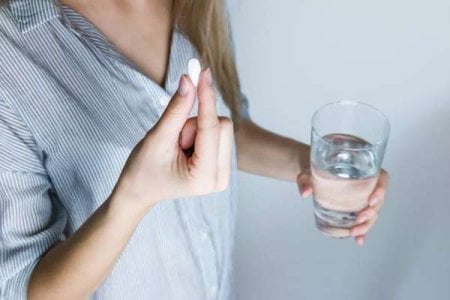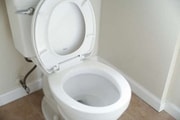Are you relying on these meds at home? Doctor reveals reason why Aussies should slow down from taking them
By
Danielle F.
- Replies 8
If you're like many Aussies, you probably have a packet of over-the-counter medicine tucked
away in your bag for emergencies.
You may also stock these medicines in your home's first aid kit.
While useful when it comes to common illnesses, a grim statistic might make you do a double take on these meds.
Everyday medications such as paracetamol have been sending nearly 100 children and teenagers to emergency departments across the country daily.
It's a sobering number, and it prompted urgent warnings from health experts and researchers alike.
However, it's not just over-the-counter medicines getting flak.

Prescription drugs such as antidepressants are also in the spotlight due to the same concern.
While these medications are safe and effective when used correctly, they could pose serious risks, especially to children.
Many of these hospitalisations were the result of accidental or intentional overdoses involving adult-only medications.
According to a recent study by the University of South Australia, at least half of these hospital visits should be preventable.
It's a reminder that even the most familiar medicines could be dangerous at the wrong dosage.
Dr Stuart Lewena, Royal Children's Hospital's Director of Emergency Medicine, highlighted how insidious paracetamol could be.
'It's one of the scary medications where early on, there may be very minimal symptoms,' Dr Lewana explained.
'It's only when the paracetamol starts to cause damage to the liver that we'll see symptoms like nausea, vomiting, and abdominal pain.'
By the time these symptoms appear, the damage may already be done.
Why are kids vulnerable?
Children's bodies process medicines differently, and they are more susceptible to adverse reactions.
Dr Imaina Widagdo, who led the UniSA research, pointed out that medicines are rarely trialled with children.
Hence, their bodies do not always understand correct dosages, safety, and efficacy well.
This finding meant that even a small error in dosing could have significant consequences.
'Kids are incredibly good at getting to things they know they're not meant to have,' Dr Lewena also warned.
That's why it's so important to keep all medications out of their sight and reach.
In response to these concerns, the federal government recently reduced the number of paracetamol tablets per pack in general stores.
Previously sold with 20 tablets per pack, the government minimised it to 16, hoping to limit the risk of accidental or intentional overdose.
Pharmacy packs are still available in larger quantities of up to 50 tablets but are kept behind the counter and require a consultation with a pharmacist.
So, what can you do to protect your family and yourself? Here are some practical steps:
Intentional overdoses, particularly among teenagers, have been a growing concern across the country.
If you or someone you know is struggling, support is available. Lifeline (13 11 14) and Kids Helpline (1800 55 1800) are there to help.
Remember, a little caution goes a long way when it comes to medication safety.

Have you ever had a close call with medication in your household? Do you have any tips for keeping medicines safe from curious grandkids? We would love to hear your stories and advice, so share them with us in the comments section below!
away in your bag for emergencies.
You may also stock these medicines in your home's first aid kit.
While useful when it comes to common illnesses, a grim statistic might make you do a double take on these meds.
Everyday medications such as paracetamol have been sending nearly 100 children and teenagers to emergency departments across the country daily.
It's a sobering number, and it prompted urgent warnings from health experts and researchers alike.
However, it's not just over-the-counter medicines getting flak.

Parecetamol is a drug that could counter headaches and the common flu. Image Credit: Pexels/JESHOOTS
Prescription drugs such as antidepressants are also in the spotlight due to the same concern.
While these medications are safe and effective when used correctly, they could pose serious risks, especially to children.
Many of these hospitalisations were the result of accidental or intentional overdoses involving adult-only medications.
According to a recent study by the University of South Australia, at least half of these hospital visits should be preventable.
It's a reminder that even the most familiar medicines could be dangerous at the wrong dosage.
Dr Stuart Lewena, Royal Children's Hospital's Director of Emergency Medicine, highlighted how insidious paracetamol could be.
'It's one of the scary medications where early on, there may be very minimal symptoms,' Dr Lewana explained.
'It's only when the paracetamol starts to cause damage to the liver that we'll see symptoms like nausea, vomiting, and abdominal pain.'
By the time these symptoms appear, the damage may already be done.
Why are kids vulnerable?
Children's bodies process medicines differently, and they are more susceptible to adverse reactions.
Dr Imaina Widagdo, who led the UniSA research, pointed out that medicines are rarely trialled with children.
Hence, their bodies do not always understand correct dosages, safety, and efficacy well.
This finding meant that even a small error in dosing could have significant consequences.
'Kids are incredibly good at getting to things they know they're not meant to have,' Dr Lewena also warned.
That's why it's so important to keep all medications out of their sight and reach.
In response to these concerns, the federal government recently reduced the number of paracetamol tablets per pack in general stores.
Previously sold with 20 tablets per pack, the government minimised it to 16, hoping to limit the risk of accidental or intentional overdose.
Pharmacy packs are still available in larger quantities of up to 50 tablets but are kept behind the counter and require a consultation with a pharmacist.
So, what can you do to protect your family and yourself? Here are some practical steps:
- Store medicines safely: Keep all medications in a locked cupboard or high shelf, well out of reach and sight of children.
- Double-check dosages: Always follow the dosing instructions on the label and use the correct measuring device.
- Talk to your pharmacist or doctor: If you're unsure about the risks of a particular medication in your household, don't hesitate to ask for advice.
- Dispose of old or unused medicines: Take them to your local pharmacy for safe disposal—don't leave them lying around.
- Be prepared for emergencies: Know the signs of overdose and have emergency numbers handy. If you suspect a child has ingested medication, seek medical help immediately.
Intentional overdoses, particularly among teenagers, have been a growing concern across the country.
If you or someone you know is struggling, support is available. Lifeline (13 11 14) and Kids Helpline (1800 55 1800) are there to help.
Remember, a little caution goes a long way when it comes to medication safety.
Key Takeaways
- Nearly 100 children and teenagers end up in emergency departments every day after taking medicines like paracetamol and antidepressants.
- At least half of these hospital visits could be prevented, with many cases linked to accidental or intentional overdoses involving adult-only medications.
- Doctors urged parents and carers to keep all medicines—especially prescription drugs—out of children's reach, as a single adult tablet could be harmful to kids.
- Researchers warned that children's bodies handle medication differently from adults, so dosages and safety aren't always accurate.







